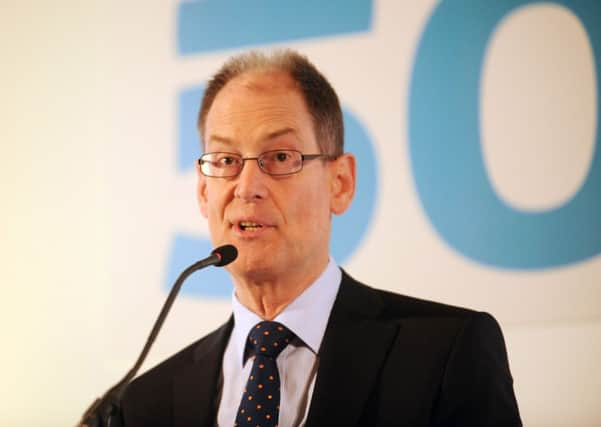Building society chairman: beware the next downturn


Ed Anderson also raised concerns over heavy-handed regulation which he said could damage Britain’s standing as a world leader in financial services.
He steps down as chairman next month after overseeing the transformation of Yorkshire Building Society into a £38bn institution.
Advertisement
Hide AdAdvertisement
Hide AdMr Anderson took on the role in 2007 just as the world was about to be plunged into financial crisis through the credit crunch.
He told The Yorkshire Post: “It’s so important not to forget what happened.
“Unfortunately, human nature is such that you do forget things but anyone who lived through that period has to make sure their successors are mindful of what actually happened.”
Governments and central banks managed to prevent the collapse of the global banking system through a series of extraordinary measures, including massive taxpayer bailouts and the slashing of interest rates, but could not stop the world from entering a deep recession.
Advertisement
Hide AdAdvertisement
Hide AdMr Anderson said current trading conditions are “benign” with very low interest rates helping borrowers and cheap funding for lenders from the Government, but warned against complacency.
He said: “Anybody who thinks this is the new world is completely wrong.
“The economic cycle is such that there will be downturns again and there will be possibly crises and we have to be ready for it. It would be very rash for any leader in financial services to say there would never be another downturn.”
Mr Anderson added: “This saying about mending the roof when the sun is shining does have some sense to it. That’s why we are investing in our systems and people currently.”
Advertisement
Hide AdAdvertisement
Hide AdBritain’s regulatory system has been overhauled in response to the financial crisis with extensive new powers handed to the Bank of England.
Mr Anderson cautioned that regulations should be proportionate to the size and complexity of the individual institution.
He said it is perfectly understandable that “the pendulum swings the other way” in the aftermath of the previous light-touch approach to banking supervision.
But he warned that current regulation is “very, very intense”.
Advertisement
Hide AdAdvertisement
Hide AdMr Anderson said: “I hope that the UK will always be a world leader in financial services as we have been and I think that is the aim of Government.
“We just need to make sure we don’t throw the baby out with the bathwater.
“Regulation that needs to be in place for a global institution like HSBC isn’t necessarily the same regulation that needs to be in place for Beverley Building Society.”
He also expressed concerns about the incoming regime aimed at individuals.
Advertisement
Hide AdAdvertisement
Hide AdMr Anderson said: “It is absolutely right that people are held to account for their decisions… (but) there is a concern that it will hard to attract the best people into key roles in financial services and that can’t be good for the UK’s position in the global market.”
Mr Anderson highlighted the important role that building societies play in providing diversity in Britain’s financial services industry. The region’s three large societies, Yorkshire, Skipton and Leeds, have been responsible for much of the new mortgage lending in the past two years.
When Mr Anderson joined the board at Yorkshire Building Society in 2003, it was seen as a very solid but not particularly well known institution, even in its northern heartland.
He was told that the organisation was “run on tramlines” and its board would know at the start of the year what its profits would be at the year end. “Well, that may have been true then but it certainly changed dramatically once the financial crisis started,” said Mr Anderson.
Advertisement
Hide AdAdvertisement
Hide AdThe global money markets seized up shortly after he became chairman in 2007.
“Those organisations that were most dependent on that source of funding were most vulnerable,” he recalled.
“The first example was Northern Rock. 70 per cent of their funding came from wholesale. 30 per cent came from retail savers. We were the exact opposite of that.”
The board at Yorkshire Building Society realised very quickly that the event was not just a blip and was the start of something very serious so began de-risking the business and reigning back on lending, said Mr Anderson.
He adedd: “For the next few years, we were in this crisis.
Advertisement
Hide AdAdvertisement
Hide Ad“Memories fade but I just remember so clearly what it was like, week to week, particularly once we got into 2008 when American banks like Lehman Brothers were falling, it was an incredibly uncertain time with the potential for the whole global financial services structure to collapse. The consequences for the world economy if that happened were just horrendous to contemplate.”
Mr Anderson praised the board for making sure there was no possibility of any members losing their money. The Bradford and Leeds-based mutual didn’t just survive though, it took opportunities as well.
In 2008, Yorkshire Building Society got the call from City regulators asking it to step in and take over Barnsley building society, which had run into problems following investments in Icelandic banks. More mergers and acquisitions activity followed with the takeover of Chelsea and Norwich and Peterborough building societies in 2010 and 2011.
Mr Anderson is replaced next month by John Heaps, a well-connected City lawyer and Yorkshireman.